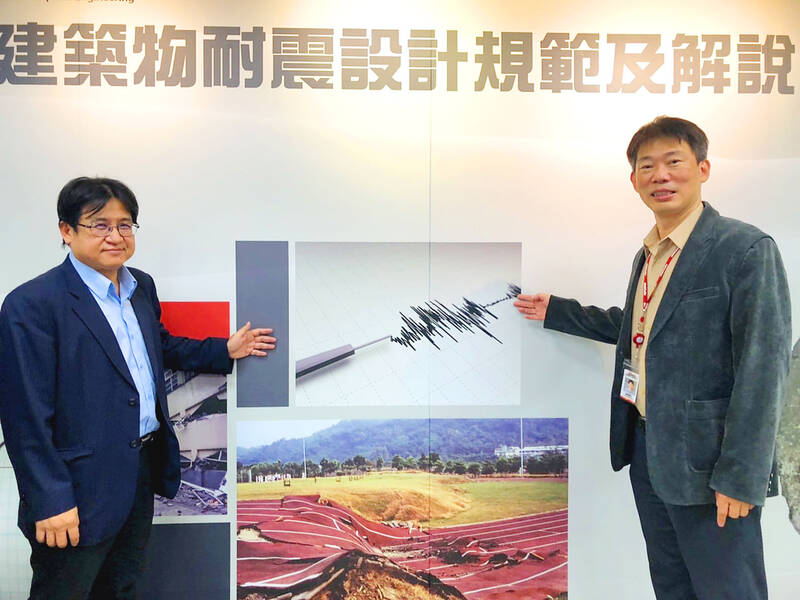The Ministry of the Interior yesterday outlined recent changes to building codes that include new mandates to reinforce structures susceptible to earthquakes.
The amendments to the Building Earthquake Resistance Design Regulations and Explanation (建築物耐震設計規範及解說) went into effect on Oct. 1.
Many tall buildings in Taiwan have been improperly modified to house street-level shop fronts, which can compromise structural integrity during a quake, National Center for Research on Earthquake Engineering Director-General Chou Chung-che (周中哲) told a news conference.

Photo: Yang Yuan-ting, Taipei Times
Illegal constructions on top of buildings are another vulnerability common in buildings throughout the nation, he said.
The new rules require susceptible buildings to install ad hoc structural reinforcements to boost safety until a long-term solution can be implemented, be it an overhaul or demolition, Chou said.
The ministry and the center have ensured that every vulnerable student dormitory up to the junior-high school level has been reinforced, he said, adding that they are now focusing on hotels, markets and other public buildings.
People who are concerned about the structural integrity of the building they live in can contact the center for help, especially for structures that have exposed pillars, he said.
The new rules revised quake resistance standards for structures near fault lines to include the ability to withstand shallow earthquakes, he added.
This means new buildings near fault lines must be 20 to 30 percent more resistant to quakes than before, which translates into an estimated 5 percent increase in construction costs, Chou said.
The center is collating information on land liquefaction cases to map risks nationwide while fine-tuning testing protocols and quality-control procedures for base isolation and quake reduction components, he said.
People are encouraged to use government subsidies to check the quake resistance of their residential buildings, Construction and Planning Agency Director-General Wu Hsin-hsiu (吳欣修) said.
“The safety of your house is far more important than its real-estate value,” he said.

Alain Robert, known as the "French Spider-Man," praised Alex Honnold as exceptionally well-prepared after the US climber completed a free solo ascent of Taipei 101 yesterday. Robert said Honnold's ascent of the 508m-tall skyscraper in just more than one-and-a-half hours without using safety ropes or equipment was a remarkable achievement. "This is my life," he said in an interview conducted in French, adding that he liked the feeling of being "on the edge of danger." The 63-year-old Frenchman climbed Taipei 101 using ropes in December 2004, taking about four hours to reach the top. On a one-to-10 scale of difficulty, Robert said Taipei 101

Taiwanese and US defense groups are collaborating to introduce deployable, semi-autonomous manufacturing systems for drones and components in a boost to the nation’s supply chain resilience. Taiwan’s G-Tech Optroelectronics Corp subsidiary GTOC and the US’ Aerkomm Inc on Friday announced an agreement with fellow US-based Firestorm Lab to adopt the latter’s xCell, a technology featuring 3D printers fitted in 6.1m container units. The systems enable aerial platforms and parts to be produced in high volumes from dispersed nodes capable of rapid redeployment, to minimize the risk of enemy strikes and to meet field requirements, they said. Firestorm chief technology officer Ian Muceus said

MORE FALL: An investigation into one of Xi’s key cronies, part of a broader ‘anti-corruption’ drive, indicates that he might have a deep distrust in the military, an expert said China’s latest military purge underscores systemic risks in its shift from collective leadership to sole rule under Chinese President Xi Jinping (習近平), and could disrupt its chain of command and military capabilities, a national security official said yesterday. If decisionmaking within the Chinese Communist Party has become “irrational” under one-man rule, the Taiwan Strait and the regional situation must be approached with extreme caution, given unforeseen risks, they added. The anonymous official made the remarks as China’s Central Military Commission Vice Chairman Zhang Youxia (張又俠) and Joint Staff Department Chief of Staff Liu Zhenli (劉振立) were reportedly being investigated for suspected “serious

American climber Alex Honnold is to attempt a free climb of Taipei 101 today at 9am, with traffic closures around the skyscraper. To accommodate the climb attempt and filming, the Taipei Department of Transportation said traffic controls would be enforced around the Taipei 101 area. If weather conditions delay the climb, the restrictions would be pushed back to tomorrow. Traffic controls would be in place today from 7am to 11am around the Taipei 101 area, the department said. Songzhi Road would be fully closed in both directions between Songlian Road and Xinyi Road Sec 5, it said, adding that bidirectional traffic controls would